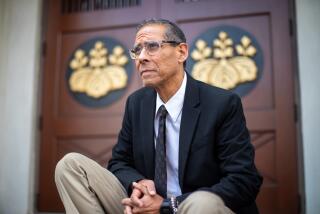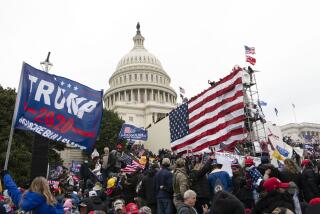Paula, Paula, Won’t You Please Come Back?
- Share via
There are times when the only thing worse than losing is winning. Such may be the case with Paula Corbin Jones vs. William Jefferson Clinton. The news of the dismissal of the Jones case was met with a feeling of divine deliverance among White House staffers who never thought a trial could be avoided.
Upon sober reflection, however, there may be reason to question the good fortune wrought by the summary judgment of Judge Susan Webber Wright. The greatest costs of the Jones case were never the trial but in the discovery period leading to the trial. With its various related appeals, the Jones case served as starter fuel for what is now a raging blaze before the grand jury and Congress.
When it was first filed, the case was the central threat to the White House, and White House lawyers fought to delay the trial at all costs. In the past few weeks, however, the White House suddenly switched positions and fought to schedule the trial at the soonest possible date. In changing its strategy, the White House correctly concluded that the Jones case was fairly anemic and unlikely to persuade a jury.
More important, a Jones trial offered a convenient avenue to respond to allegations without appearing before either the grand jury or a congressional committee. Under this strategy, the Jones case could be used as a type of suppression fire. When faced with large blazes, firefighters will often use a smaller fire in the path of the larger fire to exhaust the fuel needed to sustain the blaze. The larger fire then dies out on its own accord.
While administration officials did not start the Jones fire, they certainly realized its value in a suppression strategy. Unwilling to testify before the grand jury or Congress, the president could have testified in the Jones case and eliminated the political support for calling him for successive testimony in the other forums.
The Arkansas courtroom offered the best of the three forums for the president. Unlike the grand jury or the congressional committee, Clinton would be protected by the limitations of rules of evidence; represented by an aggressive defense counsel; supervised by a fairly sympathetic judge; and opposed by a less than popular plaintiff. Once he testified, the president could adopt a Rose Garden strategy and refer any questions to the transcript in the case.
Ironically, the White House’s greatest advocates in such a scenario could be found in the House Republican leadership. The Republican leaders would dearly love this impeachment cup to pass from their lips. An impeachment hearing would cost the Republicans an almost certain public backlash. Even a successful impeachment would only engineer an early Gore administration.
Had the president testified in the protective environs of Wright’s courtroom, the demands for the president’s testimony before the grand jury or Congress would have fallen on deaf ears.
Without Jones, the White House now will have to recalibrate its strategy to directly confront the dangers looming in the grand jury room and the congressional committee. Neither option is an enticing prospect for the president.
His lawyers are likely to advise against his testimony before the grand jury. As a grand jury witness, the president would be left in the loving hands of Independent Counsel Kenneth Starr without the protection of the rules of evidence or the assistance of counsel.
But if the president does not testify before the grand jury, there would be increased pressure for Congress to hold hearings and call him to answer these allegations.
Starr is likely to issue a report detailing alleged crimes by the president and his aides. Without the president’s prior testimony in some forum, the allegations involving Clinton in the Starr report would be largely uncontradicted. It would be near impossible to avoid hearings in such a circumstance.
This is why a loss can sometimes be more valuable than a victory in litigation. In truth, Jones may have been the best friend the president could have had in these circumstances. As is often the case, people rarely miss you until you’re gone.
More to Read
Sign up for Essential California
The most important California stories and recommendations in your inbox every morning.
You may occasionally receive promotional content from the Los Angeles Times.













